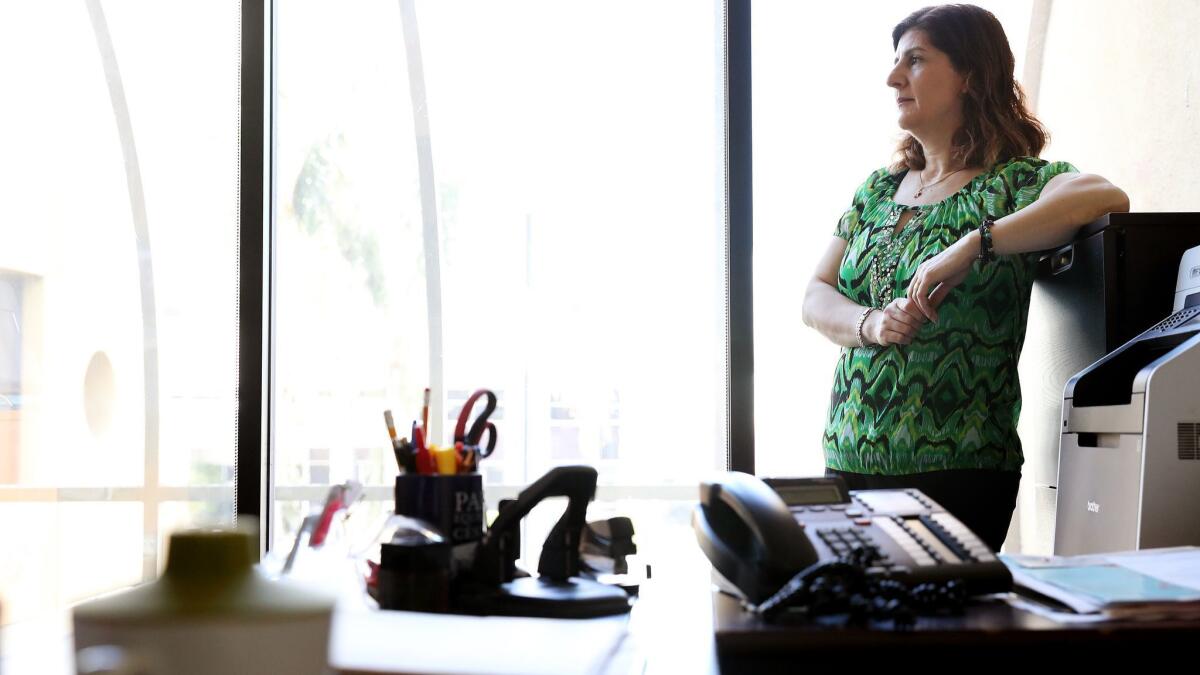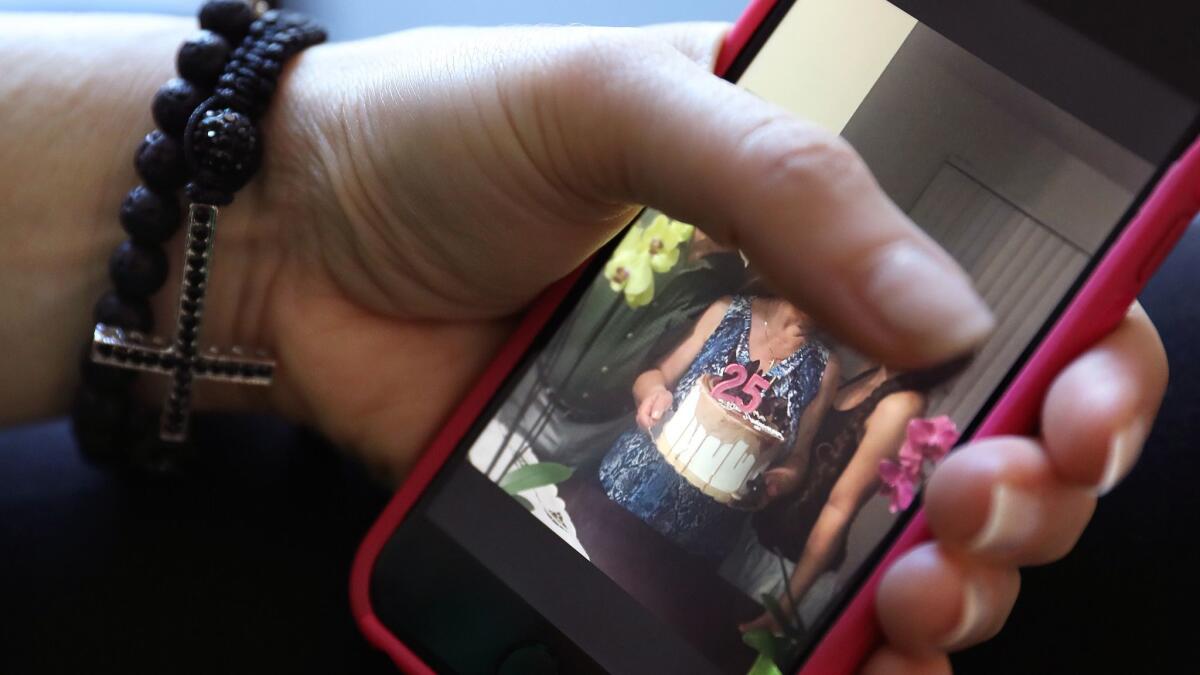Unprecedented mass denials from a U.S. asylum program leave Christians from Iran stranded in Vienna

- Share via
Even as it cracked down on immigration from predominantly Muslim countries in the Middle East and Africa, the Trump administration stressed that the safety of Christians in the region would be a priority.
In recent months, however, dozens of religious minorities from Iran have seen their asylum claims denied despite a decades-old program designed to help them. Many have been left stranded in Austria, unable to go home and unsure whether they’ll ever make it to the U.S.
The administration in February rejected the cases of 87 Iranian refugees — an unprecedented move for a program with a near 100% acceptance rate, attorneys said. The government did not provide a reason for the denials, saying it was “a matter of discretion.”
Some of the refugees, who had traveled to Vienna as part of the asylum process, and family members in the United States filed a class-action lawsuit in U.S. District Court for the Northern District of California. In July, a judge ordered the government to reconsider those cases and said it must disclose individual reasons for the denials, which would allow the applicants to file an appeal. The government estimates it will make final decisions in the reopened cases this month.
“Our clients have faced serious persecution in Iran due to their religion,” said Kate Meyer, an attorney with the International Refugee Assistance Project. “It’s impacted their ability to work, to go to school, to seek medical care for themselves or their children.”
Applications under the Lautenberg-Specter program began stalling in late 2016, Meyer said.
Enacted in 1989 to facilitate resettlement of Jews from what was then the Soviet Union, the program later was expanded to include non-Muslims from Iran. Run in partnership with the Austrian government, it requires refugees to have a U.S. sponsor who will cover the costs associated with their travel as well as the typical three- to six-month stay in Vienna. Many eventually move to California, advocates said, because of the large Iranian and Armenian diaspora.
More than 10,100 Iranian religious minorities have resettled under the Lautenberg program since the 2004 fiscal year, the government said.
Although admissions from Iran to the U.S. have not completely come to a halt under the Trump administration, they have slowed from 1,061 in the first quarter of the 2017 fiscal year to 29 in the first quarter of fiscal 2018, court records show.
A total of 35 Iranian refugees have been admitted this fiscal year as of July 31, according to data from the Refugee Processing Center.

February’s denials left Goharek Garmemasihi’s family separated.
She moved her brother, sister-in-law and niece to Los Angeles last year. But her nephew, who had traveled from Iran with them, is stuck in Vienna.
“You let the father, mother and sister come, but you tell the son, ‘No, you have to stay’?” Garmemasihi said, amazed.
In 2007 she helped her sister resettle in Southern California, using the same program without issue.
“I wouldn’t have ever thought it would be this hard,” Garmemasihi said of the family’s latest effort.
Last year, in an interview with the Christian Broadcasting Network, Trump said that it was easier for Muslims to enter the U.S. than for Christians — and that he planned to make a change. Asked whether persecuted Christians overseas would be a priority, the president said, “Yes, they’ve been horribly treated.… We are going to help them.”
The greater number of Lautenberg denials is the result of changes to the U.S. Refugee Admissions Program made under President Obama in 2016, according to a State Department official who declined to give further details. It has nothing to do with Trump’s executive orders on immigration, the official said, adding that the administration “remains committed to supporting the Iranian people.”
In court filings, according to the International Refugee Assistance Project, the government has said that enhancements to security check techniques led to the increase in denials.
But the religious refugees’ limbo has drawn bipartisan concern.
In a letter to Vice President Mike Pence earlier this year, Reps. Randy Hultgren (R-Ill.) and Jim McGovern (D-Mass.) said that the situation “makes no sense.”
The co-chairmen of the House’s Tom Lantos Human Rights Commission told Pence that he had been “eloquent” in his defense of Christians in Iran and throughout the Middle East. The vice president had made it clear that the administration would take the lead in helping to end their persecution, they noted. But they said the case of the Iranian refugees was reaching a “crisis point.”
“The law is clear: These applicants should be presumed eligible for refugee status,” they said.
Matt Saria, one of a handful of USC law students who helped the International Refugee Assistance Project with research during the lawsuit, said the Iranians he spoke with in Austria had let their guard down and assumed they would make it to America.
“Then they face a whole other nightmare in Vienna and they don’t know what to do, because they’re separated … but can’t go back because they’ve been outed as refugees,” Saria said.
Garmemasihi said the separation had taken a toll on her 24-year-old nephew, a student who hopes to pursue a career as a veterinarian in the U.S. When they video chat, he tells her that two years of his life have gone to waste.
“He says, ‘My life is going by without me having accomplished anything,’” she said.
In addition to Armenian Christians such as Garmemasihi, others resettled under the program include Jews, Zoroastrians, Bahais and Mandaeans.
One Mandaean applicant has been waiting in Vienna for 16 months, court documents show.
In a sworn statement, she said she and her son fled Iran because of constant persecution. Mandaeans, who are followers of John the Baptist, face discrimination in many ways, she said — including having people throw rocks at them during baptisms. Her son was expelled from school because of his faith and was unable to enroll in another for nearly two years, she said.
The woman, who did not want her name used for fear of retribution, left her husband behind in Iran. She hoped to move to San Jose, where much of her family has been resettled. Her status as a refugee and her ties to the lawsuit would only increase her chances of being retaliated against by the Iranian government should she be forced to return, she said.
Before she left the Islamic Republic, the woman and her husband gave up the apartment they were renting and sold their appliances. Her husband now lives with his family.
“I have no home left in Iran,” she said.
For more California news follow me on Twitter: @sarahparvini
More to Read
Sign up for Essential California
The most important California stories and recommendations in your inbox every morning.
You may occasionally receive promotional content from the Los Angeles Times.











